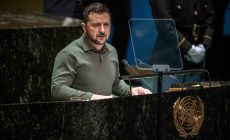UN seeks $20bn for humanitarian aid
- Posted on
- Comment
 UN aid chief Stephen O’Brien said suffering in the world had reached levels not seen in a generation, with 87 million people needing urgent help.
UN aid chief Stephen O’Brien said suffering in the world had reached levels not seen in a generation, with 87 million people needing urgent help.
An unprecedented number of people have also been driven from their homes.
Alongside Syria, the crises in Iraq, South Sudan and Yemen are expected to remain top humanitarian priorities.
The UN also warned that humanitarian organisations were approaching the end of this year with less than half of the 2015 appeal funded by donors.
The UN said more than 125 million people across the world needed humanitarian assistance and that aid organisations aimed to provide urgent help to 87.6 million of the most vulnerable and marginalised in 37 countries next year.
“Suffering in the world has reached levels not seen in a generation. Conflicts and disasters have driven millions of children, women and men to the edge of survival. They desperately need our help,” said Mr O’Brien, the UN’s under-secretary-general for humanitarian affairs and its emergency relief co-ordinator.
The UN believes that the conflicts in Syria, Iraq, South Sudan and Yemen will remain among the “greatest drivers of prolonged humanitarian needs” in 2016, fuelling new displacement within countries and across borders.
More than $3.2bn is sought to help the estimated 13.5 million people inside Syria who are in need of help, and a further $4.8bn for the 4.7 million refugees from the country sheltering in neighbouring states.
Worldwide, the number of people forced to flee their homes has already reached 60 million, a level previously unknown in the post-World War Two era.
“The international humanitarian system is all too often the only safety net that exists for people fleeing wars. It has to be funded on a scale that’s realistic and commensurate with today’s immense challenges,” said the UN High Commissioner for Refugees, Antonio Guterres.
“It is clear that with the present level of resources, we are not able to provide even the very minimum in both core protection and life-saving assistance.”
The UN is asking donor countries to provide cash quickly, but our correspondent says that may be a vain hope, with last year’s $19.9bn appeal only 49% funded.
-bbc










 (Selorm) |
(Selorm) |  (Nana Kwesi)
(Nana Kwesi)